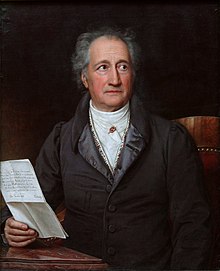
- Correct me if I'm wrong, but we both really like the novel Wilhelm Meister's Apprenticeship,* despite not liking, or rather, not being interested in its author.
- Go on.
- Wilhelm believes in the romantic life of following desire and chance where they lead. To more responsible parties that involves treating unexamined desires as necessity, and letting chance lead you into radical improvidence, into failure to secure the minimum practical necessities of life.
- 'For if we do not know our environment, we shall mistake our dreams for a part of it, and so spoil our science by making it fantastic, and our dreams by making them obligatory.' **
- Interesting quote, but I don't want to go in that direction. Wilhelm's problem is not reality, or even fantasy.
- What is Wilhelm's problem?
- Whether there can be an art to life, whether life as a whole can be a work of art.
- In his other works Goethe suggests instead that life is a matter of will, of reiterated and left behind bouts of creativity.
- But in this novel things are more complex. The argument is made that a secure foundation, a family, or a patron, or a society of friends, is required to take care of necessities whereupon chance can be followed, and become the basis of creative response, whether in life or in art. Wilhelm's actress-mistress assumes such a necessity of secure foundation, understands the insecurity of Wilhelm's intended life in the theater, and at the end of the novel it is revealed that at least partly the romantic sequence of supposed chance events has been a secret society's show produced to educate Wilhelm.
- Educate him to the importance of security upon which rely episodes of creative response to life, with life not having meaning as a whole.
- Except that what is so wonderful about the novel is that it gives exactly the opposite impression, of the romantic life of chance having meaning. Wilhelm is, unbeknownst to him, living within a show put on by secret friends, but he, within that show, acquires for himself an adoptive family, a boy and a girl.
- Creativity is not just in responding to chance, but in choosing the conditions of necessity. The society of friends adopt him, he adopts the children.
- Yes. What do you think?
- I'm thinking.
- The question hits close to home.
- In my experience, in finding the chosen foundation in the midst of romance, and so solving the problem of arbitrariness of chance, practical necessity is neglected and the whole falls apart.
- Where does that leave us?
- In great difficulty. Wilhelm explains to busnessman Werther: 'How immensely, dear friend, do you err in believing that a work, the first presentation of which is to fill the whole soul, can be produced in broken hours scraped together from other extraneous employment. No: the poet must live wholly for himself, wholly in the objects that delight him. Heaven has furnished him internally with precious gifts; he carries in his bosom a treasure that is ever of itself increasing; he must also live with this treasure, undisturbed from without, in that still blessedness which the rich seek in vain to purchase with their accumulated stores.' A family or patron must be found to take care of practical necessity, on which basis you can seek your own chosen family, in relation to, love and care for which, your episodic creative use of chance has its meaning.
- Problem solved.
- If your problem is writing a novel in which these ideas are explored. If your life as an artist is a series of such willful acts of reiterated creativity.
- But that is not the idea in this novel.
- No. If your problem is putting these ideas into effect, not merely in art, but in your life, unless you were born to the necessary conditions you have to rely on chance to create them. You must become a romantic against your will.
_______________
* Johann Wolfgang von Goethe, 'Wilhelm Meister's Apprenticeship'
** George Santayana, 'Three Philosophical Poets: Lucretius, Dante, and Goethe'